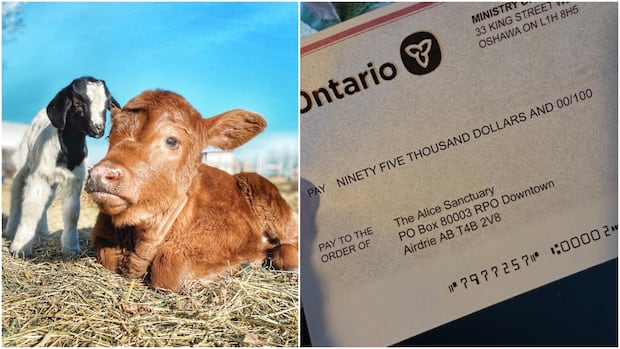At least three animal rescues and sanctuaries in Alberta have been targeted by a fraudulent cheque scam that’s also been seen in British Columbia and the United States.
Now, they’re warning others to be extra vigilant with large donations.
Janneane Madill, founder of the Alice Sanctuary, was thrilled to receive an email from a woman named Pamela Pear who wanted to donate $25,000 to the organization on behalf of her late partner.
The sanctuary, located about an hour northeast of Calgary in Rocky View County, is home to hundreds of rescued farm animals.
“In her will, she expressed a strong desire to donate a portion of her estate to your organization, with the remainder designated for the care of her beloved dog, Lizzy,” said the email.
But the cheque that eventually arrived in the mail was for $95,000, issued by what looked like Ontario’s Ministry of Finance.
Then, Madill received a request from “Pamela.”
“If you wouldn’t mind just kind of fixing the problem and sending back the $70,000 so we can get Lizzy’s medical needs handled and dealt with urgently,” Madill recalled.
Having lost pets of their own, Madill almost fell for it.
But after a visit to the bank, where a teller said the whole situation felt off, Madill quickly realized it was a scam.
‘An incredible act of selfishness’
Madill said it’s “a huge disappointment.”
“They contrived this very specific scam to target the heartstrings of people who care, people who care about people, people who care about animals,” said Madill, who said they were hoping to use the funds to hire more staff to help with the animals.
After posting their experience on social media, Madill learned several other animal sanctuaries and rescues — from B.C. to California and beyond — have been targeted by this scam.
The Calgary Humane Society was among those targeted in Alberta.
“$25,000, $95,000 goes a really long way at an organization like ours,” said Anna-Lee Fitzsimmons, the Calgary Humane Society’s director of public relations.
“An attempt to take that is an act of incredible selfishness, because we can help hundreds of animals, hundreds of families with that amount of money, if not thousands.”
The Happy Cat Sanctuary in Strathmore, Alta. also received the same email and cheque. After it was flagged by their bank, they reported it to their local RCMP detachment.
“It is always very important that if you do not know where a donation cheque is coming from that you take it to the bank to get it certified first before depositing it,” said co-founder Michele Shave in an email.
CBC reached out to the RCMP for comment, but did not hear back before publication.
A new form of cheque kiting
At the Better Business Bureau, which keeps track of scams through its online scam tracker, spokesperson Wes Lafortune said this sounds like a new form of an old employment scam called cheque kiting.
In cheque kiting, a person would be offered employment and sent a fake cheque for work equipment. Then they’re asked to send some of the money back.
But of course, “the cheques are rubber. They bounce,” said Lafortune.
Lafortune hasn’t heard of animal rescues being targeted, but he said it makes sense.
“Scammers are opportunists and so they know that these shelters are usually pretty bare-bones operations,” he said.
“If I was running a small or large animal shelter in Canada right now, I’d want to know about this because it’s probably a scam coming to you.”
Lafortune said anyone who receives a suspicious cheque in the mail should bring it to their bank for verification. He also said it’s healthy to be skeptical about large donations and to research the donor.
The Calgary Police Service said they are not seeing an increase in animal charity scams locally, but offered the following safety tips to avoid overpayment scams:
Recognize the red flags:
- Buyer offers to pay more than the asking price.
- Requests to refund the difference via gift cards, wire transfer or third party.
- Urgent or emotional stories (such as “I’m in the hospital” or “It’s for my wedding”).
- Payment made with a cheque, money order or stolen credit card.
What not to do:
- Don’t forward money to a third party.
- Don’t refund via gift cards or unconventional methods.
- Don’t rush large transactions, and take your time to verify.







